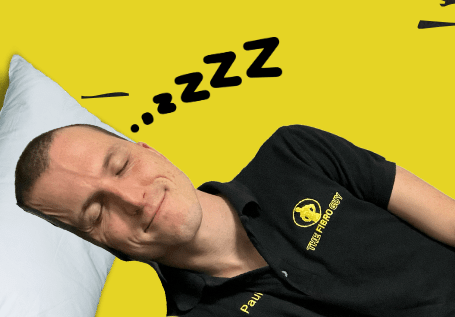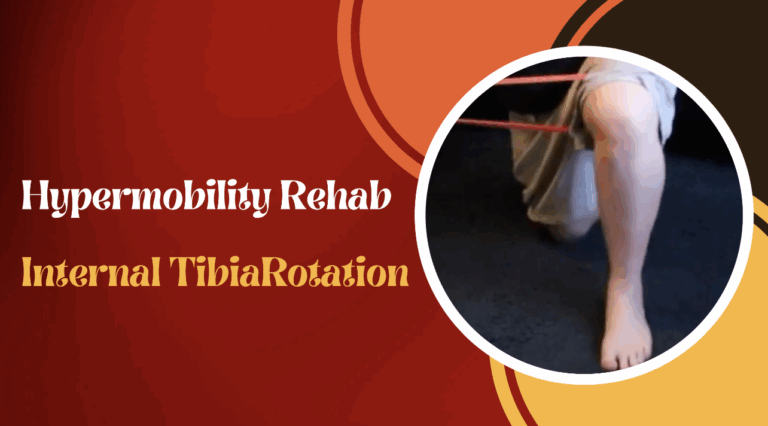- POTS and Exercise: The First Step Everyone Misses - 27 June 2025
- The Missing Link Between Breathlessness, Fatigue, and Chronic Pain: Understanding CO₂ Tolerance - 19 June 2025
- What is Mast Cell Activation Syndrome? - 12 May 2025
When it comes to sleep and napping with Fibromyalgia, we’ve all been there. In fact, one study of 1000 individuals found that napping was prevalent in around 85% of those with Fibromyalgia. Whilst the reasons around napping differed from person to person, the biggest reasons seem to include tiredness/exhaustion, not feeling well, and headaches.
If you find yourself flagging in the afternoon, trying to make it to the evening before a whole bunch of stuff is scheduled to happen, then a nap may cross your mind. However, how much does sleep matter when it comes to chronic pain, and what does the research say on the matter?
This article covers:
ToggleLack of sleep makes the pain worse!
The relationship between sleep disturbances and pain has been widely studied. Most of the research shows us that an increase in sleep disturbances comes with a sharp increase in pain. It is not only well established that poor sleep directly causes more pain, but also a swift decline in physical functioning and mood, especially during the early parts of the next day. Likewise, studies even show that a good night’s sleep appears to offer a temporary respite to pain, pushing us further down the rabbit hole that pain is an incredibly complex beast, and often, at times, is just plain weird.
Many with Fibromyalgia often try to catch up on bad sleep at the weekend. However, contrary to popular belief, it looks like you can’t bank sleep. Chronic sleep deprivation or a few restless nights can’t be remedied by one long sleep at the weekend. At least that is what the evidence suggests. Several large prospective studies go as far as to suggest that prolonged sleep problems may even increase the risk of developing chronic pain in the future for healthy individuals.
We mention briefly the impact of not getting enough sleep, but on the other side of the coin is the fact that consistently good sleep, has a remarkable and extremely profound effect on mood, cognitive functions, and health in general, not just for the general population, but for those with Fibromyalgia. Furthermore, and most importantly for you reading this article if you do have Fibro, good sleep moderates the relationship between pain interference and depression in those with chronic pain, such that good sleep quality reduces the effect of pain interference when it comes to depression and pain.
Why do we even need sleep?
Sleep as a whole is an incredibly important function; however, we still are not entirely sure why we actually sleep in the first place No, We have some theories that cover rest reasons for sleep, all the way to brain plasticity theories. However, we still don’t have a full-picture answer as to why we do actually sleep.
What is known though, is that sleep is incredibly important for us. Sleep helps our cerebrospinal fluid to effectively wash our brain, getting rid of accumulated metabolic waste and memory-impairing proteins. It keeps our immune system healthy, as lack of sleep impaired our bodies’ innate ability to release infection-fighting antibodies, as cells are reduced during periods when you don’t get enough sleep. And probably most known to all, sleep helps us to release growth hormones and repair tissue.
Sleep complications for those with Fibromyalgia
Many studies highlight the high prevalence of sleep problems in the Fibromyalgia population, with many suggesting that sleep may be related to depression through pain and physical functioning. This does appear to make sense. We already know there is a strong link between emotional regulation and lack of sleep, and if your pain is stopping you from sleeping, it will affect other aspects of you.
Restless leg syndrome
Another complication that is incredibly prevalent in those with Fibromyalgia, is restless leg syndrome(RLS). Whilst not a lot is known about the cause of RLS, it is thought to be in part, caused by issues with dopamine. Dopamine starts to taper off at the end of the day, and as it is a powerful neurotransmitter that helps to create movement, it does stand to reason that it could cause issues on a night. Likewise, research does suggest some impairment in the sensorimotor system in those with fibromyalgia, which could potentially be another cause. Then of course there are the issues that some medications such as antidepressants have been known to make RLS worse.
Interestingly, A 6-month exercise training regime was as effective as a 6-month low-dosage dopamine agonist treatment in reducing restless legs syndrome symptoms, in one study.
Gastric Issues
Another issue that seems to pop up a lot in the topic of fibromyalgia and sleep, is gastric issues. Around 2/3rds of those with fibromyalgia appear to have some form of gastric issue or another. In fact, a study by UNC Center for Functional GI & Motility Disorders found that fibromyalgia was prevalent in around 60% of those with IBS. Likewise, proinflammatory cytokines, such as interleukin-1, and interleukin-6, have been strongly associated with sleep dysfunction. Alterations in these cytokines have been seen in certain gastrointestinal diseases, such as gastroesophageal reflux disease and inflammatory bowel disease. A strong body of evidence supports changes in cytokine release, and specificity in gastrointestinal disorders, affecting the sleep-wake cycle. One thing seems pretty certain, gastric issues are likely to affect sleep and poor sleep is likely to affect gastric issues.
Numerous studies have shown that patients with IBS and/or functional dyspepsia also report poor sleep. A study of 2936 patients found that the presence of functional dyspepsia and IBS was a statistically significant risk factor for poor sleep.
Whilst gastric issues can cause poor sleep, there are also a few studies that show chronic sleep deprivation can exacerbate issues like colonic inflammation. So, somewhat of a chicken-and-egg situation, unfortunately.
Vitamin D
Deficiency in Vitamin D is common in those with fibromyalgia and has often been attributed to poor sleep. However, the evidence between vitamin D deficiency and poor sleep is somewhat controversial. Some studies do suggest a link between them, however, much more research of higher quality and with bigger cohorts, needs to be done.
The general thinking is that vitamin D receptors and the enzymes that control their activation are expressed in several areas of the brain that are involved in sleep regulation. Vitamin D is also involved in the pathways that help produce Melatonin, the hormone involved in the regulation of your sleep and wake cycle. So, it does look like Vitamin D may perhaps have either a direct or an indirect role in the regulation of sleep. And whilst vitamin D deficiency has been associated with sleep disorders, the evidence is still a little thin to concretely support the role of vitamin D supplementation in the prevention or treatment of sleep disturbances.
Let it be known that even if it does turn out to be the case that it doesn’t help sleep, there are still numerous other reasons to get checked for low Vitamin D.
Sleep apnea
There is also another fairly common problem that can affect the sleep of those with Fibromyalgia: Obstructive Sleep Apnoea(OSA)
Is there a connection between fibromyalgia and sleep apnea?
Some studies suggest a prevalence of 15% in those with Fibro. This is important to note, as OBE is notorious for causing excessive daytime sleepiness and impaired quality of life.
Obstructive sleep apnoea (OSA) is a relatively common condition where the walls of the throat relax and narrow during sleep, interrupting normal breathing. This may lead to regularly interrupted sleep, which can have a big impact on quality of life and increases the risk of developing certain conditions.
If you do believe you may have OSA, then your first port of call should be to visit your doctor to express your concerns. OSA is fairly easy to diagnose, and treatment can yield immediate relief. Consider talking to your doctor about different sleeping positions and a Continuous Positive Airway Pressure (CPAP) machine that will help keep your breathing regular throughout the night and bring about a more restful sleeping experience.
Napping with Fibromyalgia
Just like most topics when it comes to Fibromyalgia, there is an abundance of people who swear by afternoon naps and those who do not. One study found that longer napping duration seemed to be more associated with younger individuals with Fibromyalgia, than their older counterparts. Likewise, the more commodities that individuals had along with Fibromyalgia, seemed to correlate with much more napping.
So, individuals with Fibro seem to face this ultimatum, take a nap, and feel better, or take a nap and potentially feel worse. Almost a coin toss really!
You know a nap would help, but you’re not sure if it’s a good idea. I mean you could wake up renewed and refreshed, or it could make The Fibro fog even worse!
On one hand, naps can be a great way to recharge your batteries and get back to work with a refreshed mind. A 20-30 minute nap can help improve your mood, cognitive function and reaction time. I regularly take a 20-30min power nap in the Newcastle studio to recharge for the day ahead. On the other hand, naps can also make you feel groggy and can interfere with your sleep at night. If you have trouble sleeping, you may want to avoid napping.
Should you nap with Fibromyalgia?
The biggest reason to take a Nap seems to be the effect they have on mood If you’re feeling stressed, angry or just plain grumpy, a nap can help. Napping can improve your mood and increase feelings of happiness and well-being. With pain being created and mediated through an abundance of Biopsychosocial factors, taking care of your mental health, is just as important as your physical health.
Napping has also been shown to improve memory, increase alertness, enhance cognitive function, and also improve reaction time. Whether you’re playing a sport or trying to avoid falls, reaction time is important.
While a nap can improve your mood and cognitive function, it can also make you feel groggy. This is known as “sleep inertia” and it can take up to 30 minutes to shake it off. Some studies looking directly at fibromyalgia and napping found that frequently napping and for long durations, was associated with an increase in symptoms. Often making pain, depression, and anxiety worse.
Naps may also interfere with sleep. Whist daytime napping doesn’t seem to affect the general population so much, there isn’t any data on napping with fibromyalgia when it comes to sleeping at night. However, anecdotally you don’t need to look very far to find those with Fibromyalgia whose sleep is impaired if they nap during the day. So, food for thought at best.
Naps can also make you more forgetful. While naps can improve memory, they can also make you more forgetful. A nap can interfere with your “consolidation” process, which is when your brain stores new information. This is typically done during deep sleep, if napping disturbs regular sleep, you may feel more groggy/forgetful!
As we stated earlier, studies showing an increase in symptom severity when napping may be the single biggest reason to avoid daytime napping when you are diagnosed with fibromyalgia.
The Bottom Line
As you have probably noticed, there isn’t a great deal of available data out there when it comes to Fibromyalgia and napping. Sure, there are pros and cons to napping for the general population. But, there isn’t a lot out there directly for fibromyalgia.
So, if you’re feeling tired, a nap may improve your mood and cognitive function. However, naps can also make you groggy and interfere with sleep at night. Ultimately, the decision to nap or not is up to you.
If you’re trying to decide whether or not to take a nap, there are a few things to consider. First, think about how you’re feeling. If you’re feeling stressed, angry, or just plain grumpy, a nap might be a good idea.
Second, think about your cognitive function. If you need to sharpen your focus, a nap may help.
Third, consider your reaction time. Reaction time is important to avoid trips and falls that may cause you more pain.
Fourth, think about your stress levels. If you’re feeling overwhelmed, a nap may help lower your stress levels. As we mentioned earlier, your mental health is just as important as your physical health when it comes to pain.
No doubt napping has pros and cons and there is no correct answer here, so it’s important to consider how you’re feeling before you take a nap. You know yourself the best, and what may work for one person may not work for you. When it comes to Fibromyalgia and sleep it is definitely a process of trial and error!
– The Fibro Guy Team –
P.S.
Often many of those with Fibromyalgia have hypermobility syndromes, in which sleeping can become a nightmare due to various joint issues, so it’s important to keep this in mind. Below is a video on sleep position for those with hypermobility, but it translates well for those with Fibro as well.
Enjoy!
Enjoyed Our Blog? Why Stop Here?





